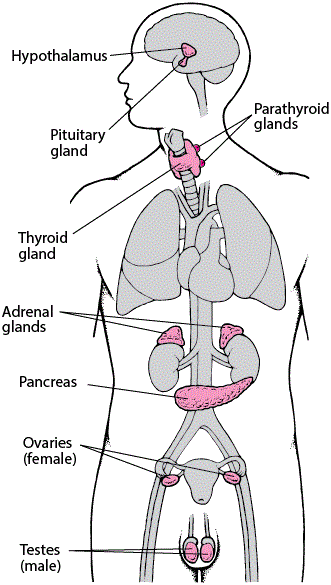Learninsta presents the core concepts of Biology with high-quality research papers and topical review articles.
Endocrine Glands and Hormones
Physiological functions of our human body is regulated and coordinated by both neural and endocrine systems. The endocrine system influences the metabolic activities by means of hormones (hormone means to excite) which are chemical messengers released into the blood and circulated as chemical signals and acts specifically on certain organs or tissues called target organs or target tissues.
Hormones may speed up or slow down or alter the activity of the target organs. The hormones secreted do not remain permanently in the blood but are converted by the liver into inactive compounds and excreted by the kidneys.
Hormones are chemical messengers because they act as organic catalysts and coenzymes to perform specific functions in the target organs. The target organs contain receptor molecules either on the surface or within the cell.
Although different hormones come in contact with cells, only the cells that contain receptor molecules specific for the hormone are physiologically activated. A single hormone may have multiple effects on a single target tissue or on different target tissues.
Many hormones exhibit long term changes like growth, puberty and pregnancy. Hormones often influence many organs and organ systems at the same time. Serious deficiency or excess secretion of hormones leads to disorders. Hormones coordinate different physical, physiological, mental activities and maintain homeostasis. Hormones are composed of water soluble proteins or peptides or amines or fat soluble steroids.
While many parts of the body make hormones, the major glands that make up the endocrine system are the:
- Hypothalamus
- Pituitary
- Thyroid
- Parathyroids
- Adrenals
- Pineal body
- The ovaries
- The testes
Endocrine glands are ductless glands and release the substances that they make (hormones) directly into the bloodstream. These glands form part of the endocrine system and information on them is included in this website. There is another type of gland called an exocrine gland (e.g. sweat glands, lymph nodes).
The following are integral parts of the endocrine system:
Hypothalamus. The hypothalamus is located at the base of the brain, near the optic chiasm where the optic nerves behind each eye cross and meet.
- Pineal body
- Pituitary
- Thyroid and parathyroid
- Thymus
- Adrenal gland
- Pancreas
- Ovary
The symptoms of an endocrine disorder vary widely and depend on the specific gland involved. However, most people with endocrine disease complain of fatigue and weakness. Blood and urine tests to check your hormone levels can help your doctors determine if you have an endocrine disorder.
When you are facing a diagnosis of a hormonal condition, like diabetes or thyroid disease, your doctor may suggest you see an endocrinologist. You may be wondering why you need to see a specialist instead of simply sticking with your primary doctor.
Endocrinologists are qualified to diagnose and treat conditions like diabetes, thyroid diseases, infertility, growth issues, metabolic disorders, osteoporosis, some cancers, and disorders in the hormone-producing adrenal glands and pituitary glands.
Beginning the examination with the hands establishes a personal connection with the patient and reinforces the trust between physician and patient that was initiated during the history. It opens the possibility for an equal exchange between doctor and patient as both observe and talk about the hands.
